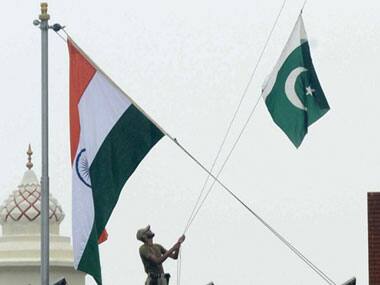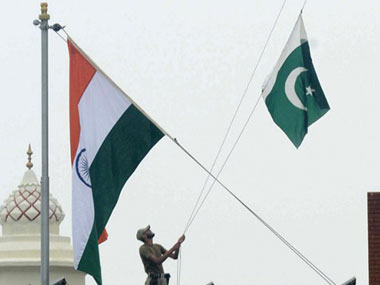The Sensex fell by nearly 1600 points on Monday; the rupee touched a two-year low against the dollar. Pity there is no index to measure the direction of India-Pakistan relationship. Had there been one, it would have shown a new low, even a free fall after the acrimonious end to the fiasco over NSA-level talks. The only safe prediction about India-Pakistan ties is that they will remain unpredictable. We have seen so many flip-flops, bizarre U-turns and somersaults in the past two years that nobody can say with certainty what will be the next big event in India-Pakistan diplomacy. [caption id=“attachment_2405798” align=“alignleft” width=“380”]
 Representational image. AFP[/caption] Pakistan is lucky that Narendra Modi is not the leader of the opposition in India. Had he been in opposition, Modi would have ripped apart Pakistan for the continuous firing on the LoC, repeated incursions on the border, its support to Kashmiri separatists and incurable habit of wriggling out of talks and negotiations. Thankfully for Pakistan, the Indian Prime Minister is bound by various compulsions — domestic as well as international — and he can’t afford to have a rigid Pakistan policy. Instead of having a long-term plan, Modi has to resort to ad-hocism, react to events, blow with the wind and fine-tune India’s diplomacy on the go. Modi has to take turns being a peace dove, probably under international pressure, and a hawk, certainly under domestic compulsions and because of impending elections, like the ones facing him in Bihar. During the 2014 election campaign Modi berated Pakistan at every available opportunity. But he surprised everybody by inviting Nawaz Sharif to his swearing-in, conveying, like British prime minister Neville Chamberlain in 1938, hopes of ‘peace for our time’. A few months later Sharif and Modi were seen sulking at the SAARC summit so much that they didn’t even bother greeting each other publicly. And then the two met at Ufa and announced resumption of dialogue, only to cancel it because of disagreement over the guest-list and the menu. Knowing Modi and Sharif, hope is just a volte face away. For all we know, India may soon send a shawl for the women in Sharif’s household, eliciting a box of mangoes as return gift. There is still ample scope for a bilateral exchange that could lead to a selfie at the SAARC summit in Islamabad, where Sharif expects Modi next year, if not on his own volition, then at least after some prodding by the US. Unlike Chamberlain, we can still be hopeful of peace in our time. But, at the moment, everybody is confused. “Sitting on this side of the border, one cannot fathom what the Indian leadership is thinking…In Pakistan, the general feeling is that India is not interested in talks. In fact, many pundits had earlier predicted that New Delhi would call off the talks before anything could be discussed on the table. We believe here that India wants to call the shots but we are unwilling to give in,” writes Kamal Siddiqi, editor of the Express Tribune. Many in India echo his sentiment. Former Indian high commissioner to Pakistan, Satyabrata Pal, laments in Thewire.com the “sad farce that has played out over the past few days in Delhi shows once again how wise the man was who warned that one should never underestimate the predictability of stupidity.” Could there be a method to this farce? Some experts believe that Modi has a clearly defined Pakistan policy, with two objectives. One, to address the domestic constituency by raising the bogey of Pakistan intermittently and satiating the anti-Pakistan feelings of his core voter by humiliating the neighbour publicly. The second objective, according to believers in the Modi-has-a-Pak-policy theory, is to isolate Pakistan in the international fora and in the sub-continent. Indian strategic affairs expert C Raja Mohan writes the Modi government might be betting on a favourable outcome based on “the premise that the balance of forces in the region and beyond are turning India’s favour and that Delhi can be more assertive on cross-border terrorism in Kashmir.” But, he concludes by warning that if Modi’s bold gamble on Pakistan fails, India will have to pay a huge price, especially in Kashmir. Kamal Siddiqi notes the recent efforts Modi has made to mend relations with Nepal, Bangladesh, Sri Lanka and the Emirates. He argues that Pakistan needs to win back old friends and make new ones to ensure Modi doesn’t get other leaders to go along with him. Can India isolate Pakistan and rub its nose in the ground by avoiding negotiations? It will be possible only if Modi makes China, Russia and the US acquiesce to the policy of keeping Pakistan away from the discussion table unless India sets the agenda and the neighbour agrees without a whimper of protest. He will succeed only if the global community’s sees Kashmir as more important than Pakistan’s strategic value vis a vis Afghanistan? More importantly, his plan would be viable only if India is able to deal with the fallout of increased hostility in Kashmir, where the ground is fertile for radicalism and unrest. Of course, when everything else fails, he can go back to the shawls and mangoes.
Representational image. AFP[/caption] Pakistan is lucky that Narendra Modi is not the leader of the opposition in India. Had he been in opposition, Modi would have ripped apart Pakistan for the continuous firing on the LoC, repeated incursions on the border, its support to Kashmiri separatists and incurable habit of wriggling out of talks and negotiations. Thankfully for Pakistan, the Indian Prime Minister is bound by various compulsions — domestic as well as international — and he can’t afford to have a rigid Pakistan policy. Instead of having a long-term plan, Modi has to resort to ad-hocism, react to events, blow with the wind and fine-tune India’s diplomacy on the go. Modi has to take turns being a peace dove, probably under international pressure, and a hawk, certainly under domestic compulsions and because of impending elections, like the ones facing him in Bihar. During the 2014 election campaign Modi berated Pakistan at every available opportunity. But he surprised everybody by inviting Nawaz Sharif to his swearing-in, conveying, like British prime minister Neville Chamberlain in 1938, hopes of ‘peace for our time’. A few months later Sharif and Modi were seen sulking at the SAARC summit so much that they didn’t even bother greeting each other publicly. And then the two met at Ufa and announced resumption of dialogue, only to cancel it because of disagreement over the guest-list and the menu. Knowing Modi and Sharif, hope is just a volte face away. For all we know, India may soon send a shawl for the women in Sharif’s household, eliciting a box of mangoes as return gift. There is still ample scope for a bilateral exchange that could lead to a selfie at the SAARC summit in Islamabad, where Sharif expects Modi next year, if not on his own volition, then at least after some prodding by the US. Unlike Chamberlain, we can still be hopeful of peace in our time. But, at the moment, everybody is confused. “Sitting on this side of the border, one cannot fathom what the Indian leadership is thinking…In Pakistan, the general feeling is that India is not interested in talks. In fact, many pundits had earlier predicted that New Delhi would call off the talks before anything could be discussed on the table. We believe here that India wants to call the shots but we are unwilling to give in,” writes Kamal Siddiqi, editor of the Express Tribune. Many in India echo his sentiment. Former Indian high commissioner to Pakistan, Satyabrata Pal, laments in Thewire.com the “sad farce that has played out over the past few days in Delhi shows once again how wise the man was who warned that one should never underestimate the predictability of stupidity.” Could there be a method to this farce? Some experts believe that Modi has a clearly defined Pakistan policy, with two objectives. One, to address the domestic constituency by raising the bogey of Pakistan intermittently and satiating the anti-Pakistan feelings of his core voter by humiliating the neighbour publicly. The second objective, according to believers in the Modi-has-a-Pak-policy theory, is to isolate Pakistan in the international fora and in the sub-continent. Indian strategic affairs expert C Raja Mohan writes the Modi government might be betting on a favourable outcome based on “the premise that the balance of forces in the region and beyond are turning India’s favour and that Delhi can be more assertive on cross-border terrorism in Kashmir.” But, he concludes by warning that if Modi’s bold gamble on Pakistan fails, India will have to pay a huge price, especially in Kashmir. Kamal Siddiqi notes the recent efforts Modi has made to mend relations with Nepal, Bangladesh, Sri Lanka and the Emirates. He argues that Pakistan needs to win back old friends and make new ones to ensure Modi doesn’t get other leaders to go along with him. Can India isolate Pakistan and rub its nose in the ground by avoiding negotiations? It will be possible only if Modi makes China, Russia and the US acquiesce to the policy of keeping Pakistan away from the discussion table unless India sets the agenda and the neighbour agrees without a whimper of protest. He will succeed only if the global community’s sees Kashmir as more important than Pakistan’s strategic value vis a vis Afghanistan? More importantly, his plan would be viable only if India is able to deal with the fallout of increased hostility in Kashmir, where the ground is fertile for radicalism and unrest. Of course, when everything else fails, he can go back to the shawls and mangoes.
NSA talks fiasco: PM Modi has a clear Pakistan policy, but will it work?
Sandipan Sharma
• August 25, 2015, 12:24:11 IST
Some experts believe that Modi has a clearly defined Pakistan policy, with two objectives. One, to address the domestic constituency by raising the bogey of Pakistan intermittently and satiating the anti-Pakistan feelings of his core voter by humiliating the neighbour publicly. The second objective, according to believers in the Modi-has-a-Pak-policy theory, is to isolate Pakistan in the international fora and in the sub-continent.
Advertisement
)
End of Article